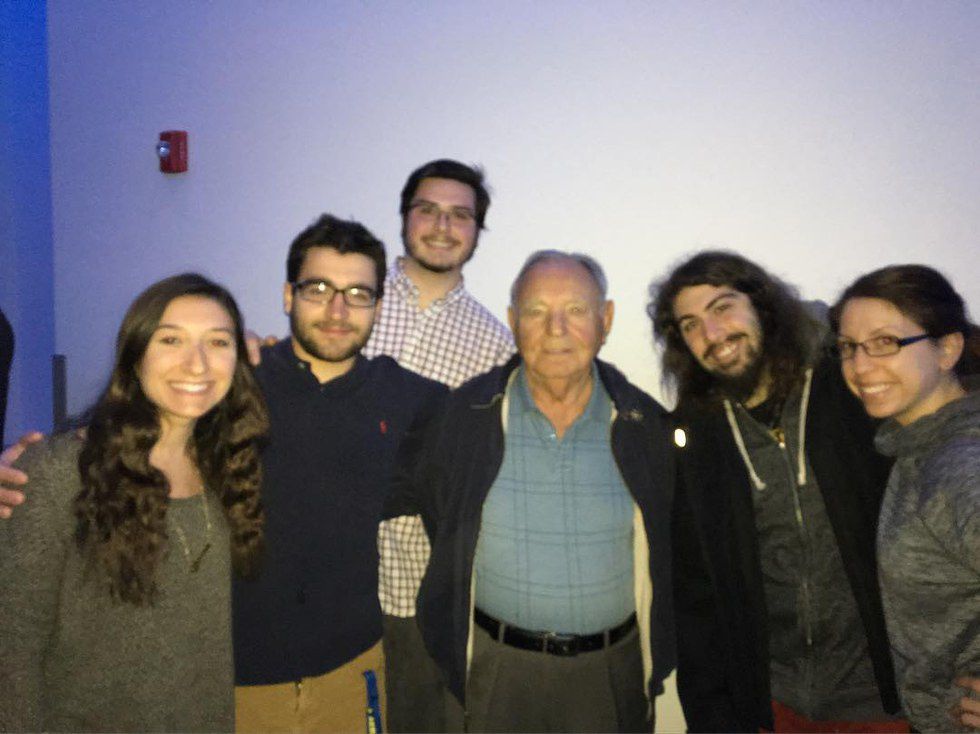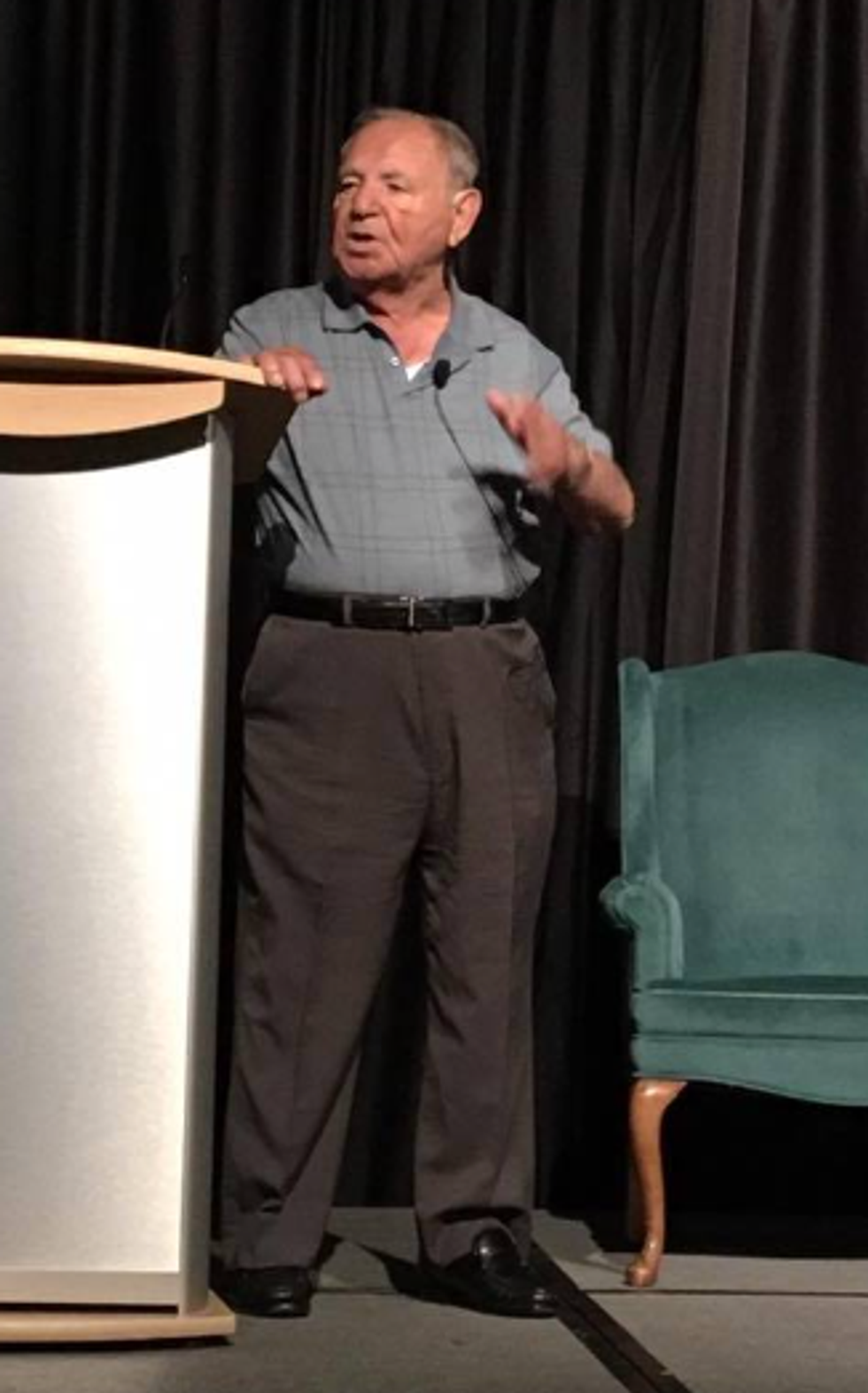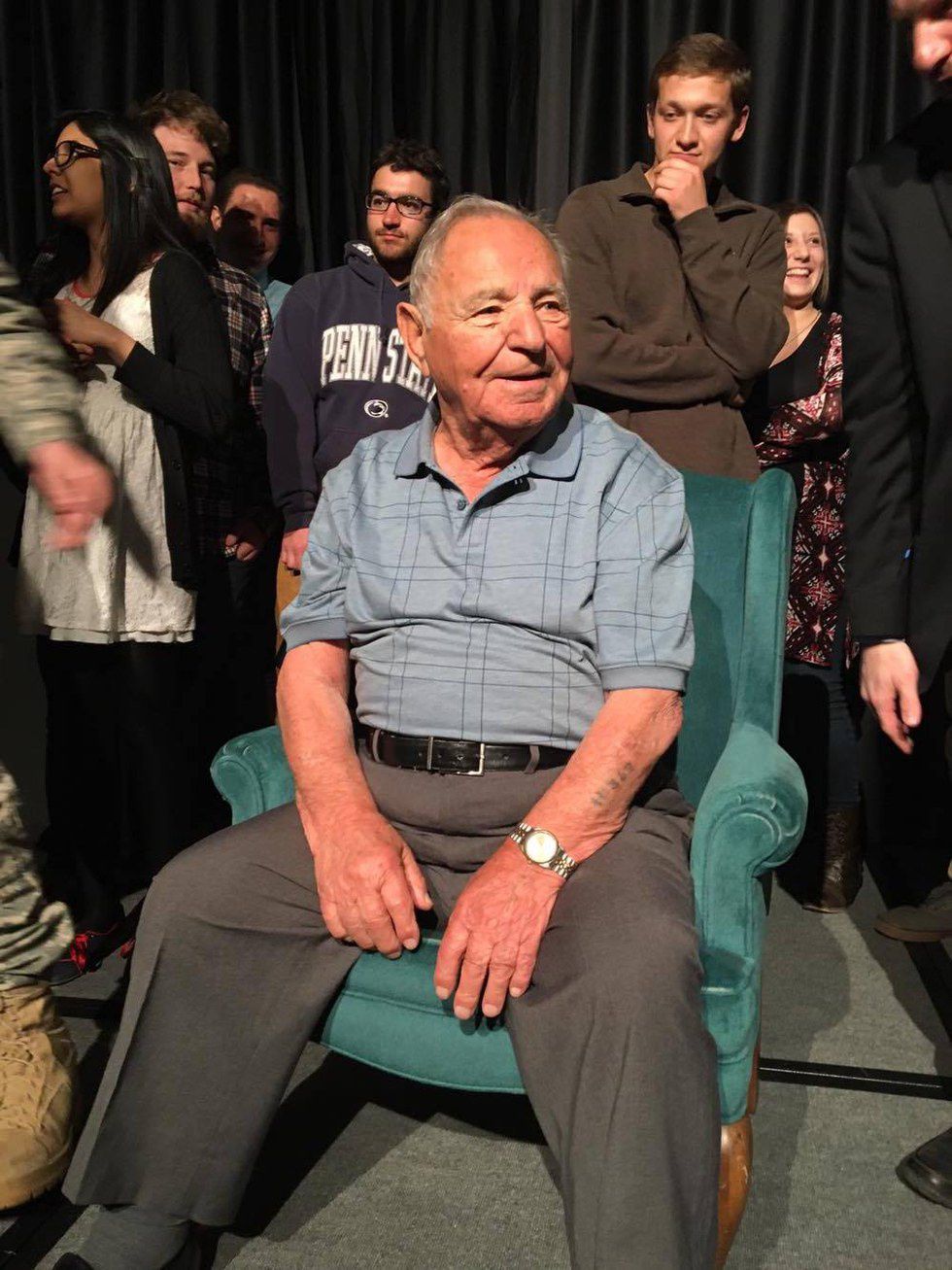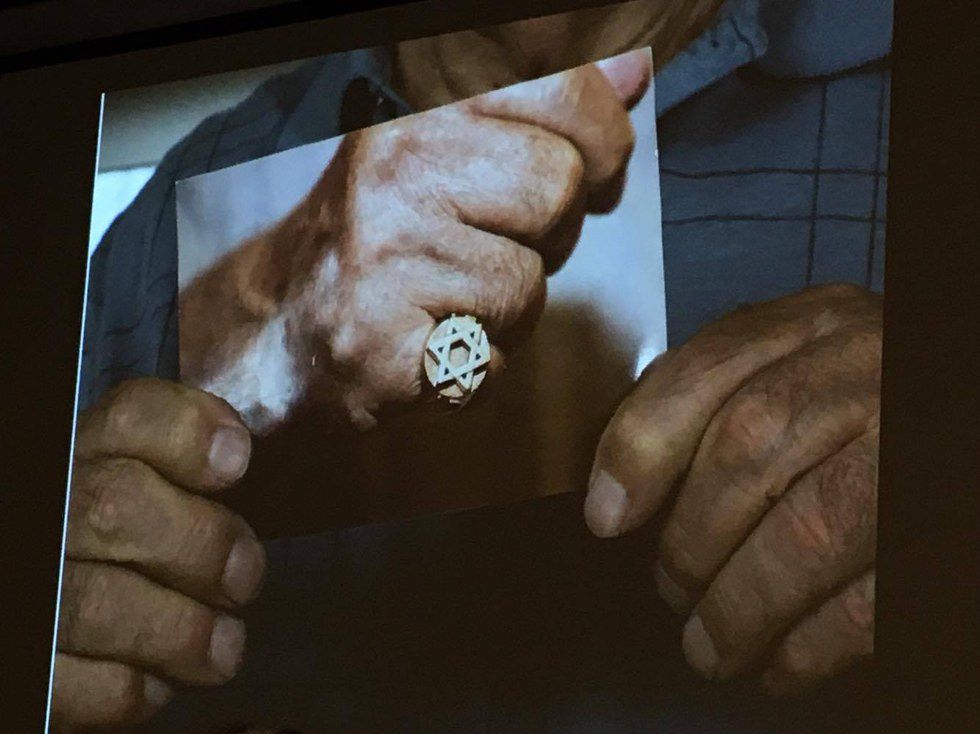Speaking almost a dozen languages, cracking jokes and constantly smiling- you would never guess that this same man survived the horrors of the Holocaust.
On Wednesday, February 24th, about 1,500 students, faculty and community members gathered into the Lory Student Center at Colorado State University to hear the story of 91-year-old Albert Rosa’s fight for freedom.
Rosa began his story by saying, “I am proud to be a Jew. Always proud of it.” These words followed us through the fight he faced in Greece, Poland, and Germany and helped us understand and relate to why he did what he did to survive.
Rosa’s wife, Betty Rosensweig, also survived the Holocaust. She was born in Austria with blonde hair and blue eyes and spoke German—traits that helped her survive the war. Later, the two of them and their newborn daughter, Regina, moved to the United States. Like many other Holocaust survivors and soldiers, Rosa suffered from Post Traumatic Stress Disorder (PTSD), and once they arrived in the Land of the Free, Rosa began having nightmares about being back in Europe fighting Nazis. One night, he had a nightmare that was Nazi attacking him and he was fighting back. Rosa was beating the Nazi and then he woke up. Rosa wasn’t beating Nazis, but his wife.
It was after that night that Rosa checked into a mental institute to get help. After months of shock therapy, he wanted to leave the institute and to leave what he describes as “torture.” The doctor told him that if he wanted the nightmares to go away, he shouldn’t speak of the Holocaust. Rosa took the advice and for about 50 years, he didn’t speak of the Holocaust.
When his children would ask about his family, he would lie and said they passed away. If they asked about the numbers tattooed on his arm, he would say it was a phone number. It was when his youngest daughter, Yvette, went to Europe and learned about the Holocaust that she put the pieces together. She came home to her father and told him she knew what happened to him and that he needs to tell the next generation his story.
Rosa’s fight began in Salonika, Greece when his father's shop was shut down by the German’s and his bank account was drained because he was Jewish. Rosa stopped going to school in 1939 due to the war and was forced to build railroad tracks when he was 14-years-old.
After a year of slave labor, Rosa and his family were moved into a ghetto. Rosa witnessed people die in the streets due to starvation. He started sneaking out of the ghetto to bring back a pound of bread, which he would distribute door to door of his family members' homes. Once it grew dark, everyone was required to be inside or the Germans would kill them.
Rosa’s father was a very religious man. One day, Rosa attended Synagogue with his father when a boy kept throwing stones at his father until he knocked the yamaka from his head. Rosa’s father told him not to do anything, not to cause trouble, and just to ignore him. Rosa felt could not do that and snuck out and looked for the boy. When he finally found him, he knocked the boy out.
This was not the last encounter in the ghetto where Rosa’s family was attacked. One day, the Germans came into their home and started beating his family members. Their neighbor came over and said in German, “Why do you do that? We are humans.” The Germans shot Rosa’s neighbor right then and there.
After about seven months in the ghetto, Rosa and his family were separated and placed into boxcars. Rosa said there were about 80 to 90 people in the car, one on top of the other. “You could barely breathe,” Rosa said. After two days in the car, people had to use the bathroom but there was nowhere to go. Woman would have to lift their dresses and go in the boxcar, in front of everyone. Rosa described the experience as “dehumanizing.” Many people began dying and the stench “was so horrible. Unlike anything you could imagine,” as Rosa described. He became so exhausted from standing in the boxcar that he would rest his body on top of his dead neighbor. Ten days later, they arrived at the Auschwitz-Birkenau concentration camp in Poland. When they opened the gates only one-third of the people had survived in the car and it was winter. Rosa didn’t have shoes and thought he would freeze.
Everyone was automatically tattooed on entry. 110362—the number that would stay with Rosa the rest of his life. He was taken to Block Seven and given a bunk to sleep in with ten other men packed in together. Rosa was sure he’d freeze to death that first night. Before long, he was woken up by a whip beating him.
Only 16 years old at this time, Rosa was assigned to hard labor in the gold mines.
Rosa was the youngest in his family and was very close with his oldest sister, Luna. He eventually found out where she was working in the camp and was determined to see her. Rosa made a deal with his friend that if they could switch uniforms, he would give his friend his food for two days. His friend responded by saying, “Are you crazy? They will catch us.” Rosa, desperate to see his sister, said, “People are starving, do you want my food or not?”
Rosa went out into the field where men and woman were separated to dig. He looked around until he spotted his sister and her beautiful blue eyes. She looked so different because her long, beautiful black hair was all gone and her face was thin. Rosa called out, “Luna! Luna!” and she recognized him right away.
Luna began asking about their grandparents and parents, but Rosa didn’t have the heart to tell her that they were dead. While Rosa and Luna were talking, a big German woman with her German Shepard came over, said something in German and started beating her, cracking his sister's head. Rosa wanted to say something but the only phrase he knew in German was, “Work faster, goddamn Jew.”
“You called me a Jew. I'm not a Jew,” she responded as she sent the German Shepherd to attack him. Rosa immediately put his arm up to protect his face, something his brother had taught him, so the dog wouldn’t take his eyes out. Rosa then tried to choke the dog with all his might, but he couldn't catch his breath. He thought his ribs were broken and that this was the moment he was going to die. Eventually he got the dog off of himself and every time he would try to look to see if his sister was okay, he would be beaten. He was able to look over and when the Nazis took her lifeless body away. It was the last time he saw her.
Rosa later saw his brother, Daniel, and told him about their sister. Daniel decided he was going to avenge Luna’s death. One day, the two of them were working in the kitchen and found a bag of raw potatoes and began eating them. “When you are starving, everything tastes good,” Rosa explained. The guards caught them eating and beat Rosa and took his brother to be hung. It was then Rosa promised Daniel, “I will do my best to stay alive and I will avenge you.”
Later on, Rosa was forced on the “death march” from Warsaw to Dachau. After reaching Dachau, Rosa was moved to Kaufering, another concentration camp in Poland, where he and the others were to be killed. He and seven other prisoners were able to escape. Rosa advised them not to run straight, but zig-zag, so the Germans couldn’t shoot them. Two of the prisoners were killed. In order to keep from being caught, Rosa came up with an incredible idea. “All of us walked backwards so the Germans would see our footsteps in the snow and think we are walking the opposite way,” Rosa said.
They eventually arrived at a farmhouse. They were all so cold they could barely open the barn door. Once inside, there was nothing to keep them warm, so they had to cover themselves in manure to warm up. Then, an old German man came running into the farmhouse and began shooting, followed by two men who didn’t look German. Rosa realized they were American soldiers. They liberated the prisoners and handed Rosa a gun. Rosa faced the old man as he begged for Rosa not to kill him. “I didn’t want to kill an old man,” Rosa said. “Not like that.”
Rosa made the old man let them into the basement to eat. They ate for three days so they could be strong enough to walk the mile to the American army. Three of them died from eating too much and getting sick from the food.
Rosa fought side by side with the American soldiers for six months. One of his duties in the camps was to remove gold teeth from dead prisoners and he would occasional slip a tooth into his pocket. When fighting with the American’s, Rosa used a gold ring with a gold Jewish star on it that he made out of the gold crowns to beat the Nazis with so it left a Jewish star on them.
Rosa says, “I was born a fighter, I’m going to die a fighter.” Today, he still has to fight for himself as Jew. While working in an upholstery shop in Denver, Rosa went to the bathroom and saw a drawing of him hanging from a swastika with “Al” written above it. Rosa knew it was the doing his co-worker, Ramon. Knowing that the owner of the company was Jewish, Rosa went to tell him what happened. The owner told Rosa to forget about it, that the Holocaust was the past, and that he shouldn’t talk about it. Without any help from the owner, Rosa went to Ramon and asked if he did this. “What are you going to do?” Ramon said. Rosa knocked him out unconscious.
At 91-years-old, Rosa travels all over to tell people his story so that people know and understand. He has received seven medals, including a Purple Heart. He is a member of the Jewish Defense League, JDL, and helps out at California Police Departments.
























